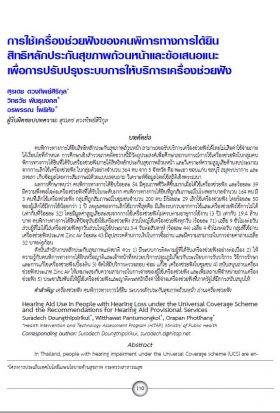This website uses cookies so that we can provide you with the best user experience possible. Cookie information is stored in your browser and performs functions such as recognising you when you return to our website and helping our team to understand which sections of the website you find most interesting and useful.
การใช้เครื่องช่วยฟังของคนพิการทางการได้ยินสิทธิหลักประกันสุขภาพถ้วนหน้าและข้อเสนอแนะเพื่อการปรับปรุงระบบการให้บริการเครื่องช่วยฟัง

รายละเอียดเพิ่มเติม
สุรเดช ดวงทิพย์สิริกุล*
วิทธวัช พันธุมงคล*
อรพรรณ โพธิหัง*
บทคัดย่อ:
คนพิการทางการได้ยินสิทธิหลักประกันสุขภาพถ้วนหน้า สามารถขอรับบริการเครื่องช่วยฟังได้โดยไม่เสียค่าใช้จ่ายภายใต้เงื่อนไขที่กำหนด การศึกษาเชิงสำรวจภาคตัดขวางนี้มีวัตถุประสงค์เพื่อศึกษาสถานการณ์การใช้เครื่องช่วยฟังในกลุ่มคนพิการทางการได้ยินที่ได้รับเครื่องช่วยฟังภายใต้สิทธิหลักประกันสุขภาพถ้วนหน้า และวิเคราะห์ความสูญเสียด้านงบประมาณจากการเลิกใช้เครื่องช่วยฟัง ในกลุ่มตัวอย่างจำนวน 364 คน จาก 5 จังหวัด คือ พะเยา ขอนแก่น ชลบุรี สมุทรปราการ และสงขลา เก็บข้อมูลโดยการสัมภาษณ์ด้วยแบบสอบถาม วิเคราะห์ข้อมูลโดยใช้สถิติเชิงพรรณนา ผลการศึกษาพบว่า คนพิการทางการได้ยินร้อยละ 54 มีคุณภาพชีวิตดีขึ้นมากเมื่อได้ใช้เครื่องช่วยฟัง และร้อยละ 39 มีความพึงพอใจต่อเครื่องช่วยฟังที่ได้รับในระดับมาก คนพิการทางการได้ยินที่ถูกสัมภาษณ์ในโรงพยาบาลจำนวน 164 คน มี 3 คนที่เลิกใช้เครื่องช่วยฟัง กลุ่มที่ถูกสัมภาษณ์ในชุมชนจำนวน 200 คน มีร้อยละ 29 เลิกใช้เครื่องช่วยฟัง โดยร้อยละ 50 ของผู้เลิกใช้มีการใช้น้อยกว่า 1 ปี เหตุผลของการเลิกใช้มากที่สุดคือ มีเสียงรบกวนจากการใช้และเครื่องช่วยฟังใช้การไม่ได้ (เท่ากันที่ร้อยละ 32) โดยมีมูลค่าสูญเสียสะสมจากการใช้เครื่องช่วยฟังไม่ครบตามอายุการใช้งาน (3 ปี) เท่ากับ 19.4 ล้านบาท คนพิการทางการได้ยินที่ปัจจุบันยังใช้เครื่องช่วยฟัง ส่วนใหญ่ใช้เครื่องช่วยฟังทุกวัน (ร้อยละ 71) เฉลี่ย 9 ชั่วโมงต่อวัน ส่วนผู้ที่ไม่ได้ใส่เครื่องช่วยฟังทุกวันส่วนใหญ่ใช้ประมาณ 3-4 วันต่อสัปดาห์ (ร้อยละ 44) เฉลี่ย 4 ชั่วโมงต่อวัน กลุ่มที่ใช้ถ่านเครื่องช่วยฟังประเภท Zinc Air ร้อยละ 43 มีอุปสรรคด้านการเงินในการซื้อถ่าน และมีความสามารถในการจ่ายค่าถ่านเฉลี่ย 32 บาทต่อก้อน ดังนั้นสำนักงานหลักประกันสุขภาพแห่งชาติ ควร 1) มีระบบการติดตามผู้ที่ได้รับเครื่องช่วยฟังอย่างต่อเนื่อง 2) ให้ความรู้กับคนพิการทางการได้ยินหรือญาติและเจ้าหน้าที่หน่วยบริการปฐมภูมิเกี่ยวกับระเบียบการรับบริการ วิธีการรักษา และการแก้ไขเครื่องช่วยฟังเบื้องต้น 3) จัดให้มีบริการตรวจสอบ ซ่อม แก้ไข เครื่องช่วยฟังในชุมชน 4) สนับสนุนถ่านเครื่องช่วยฟังประเภท Zinc air ให้เหมาะสมกับความสามารถในการจ่ายของผู้ใช้เครื่องช่วยฟัง และเพิ่มสถานที่จำหน่ายถ่านเครื่องช่วยฟัง 5) ประชาสัมพันธ์ให้ผู้ใช้เครื่องช่วยฟังและญาติตระหนักถึงค่าใช้จ่ายเครื่องช่วยฟังที่ภาครัฐได้มีการสนับสนุนให้
Abstract:
In Thailand, people with hearing impairment under the Universal Coverage scheme (UCS) are entitled to having hearing aid free of charge from accredited hospitals. This cross-sectional survey aims to describe the situation regarding hearing aid usage and economic loss from discontinuing usage of hearing aid in people with hearing impairment under the UCS. Data were collected from 364 persons in five provinces (Phayao, Khon Kaen, Chonburi, Samut Prakan, and Songkhla) through face-to-face structured interviews. Descriptive statistics were used for data analyses. The results showed that 54% of the sample experienced improvement in quality of life and 39% were satisfied with hearing aid use. Out of the 164 persons who were interviewed at hospitals, three stopped wearing hearing aid. For the 200 persons who were interviewed in the community, 29% stopped hearing aid use, to whom 50% used for less than one year. The most common reasons for discontinuing usage were high background noises and faulty devices. The economic loss from discontinuing usage up to third year was estimated to be 19.4 million baht. For subjects who were still using the hearing aid, 71% wore the hearing aid daily for 9 hours on average, whereas 44% occasionally wore approximately 3-4 days a week for four hours per day. For persons who used hearing aid with zinc-air battery, around 1-2 batteries were used per month, costing 65-96 baht a month. 43% stated that the cost of batteries was a burden as they were only able to pay approximately 32 baht per battery. Therefore, the National Health Security Office should: 1) set up a follow-up system for hearing aid users; 2) provide training or guideline to hearing aid users, their relatives, and primary care unit officer regarding the service, procedure of treatment, and basic maintenance of hearing aid; 3) set up mobile service for hearing aid maintenance in community; 4) support zinc-air battery in order to match the ability to pay of users and increase distribution channels to sell hearing aid battery; and 5) raise the awareness to hearing aid users and their relatives regarding the government subsidized cost of hearing aid.




